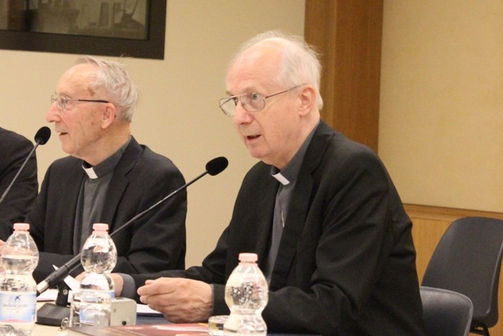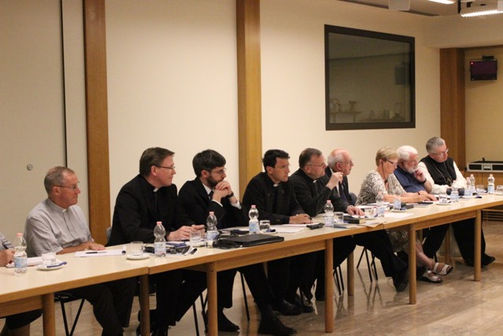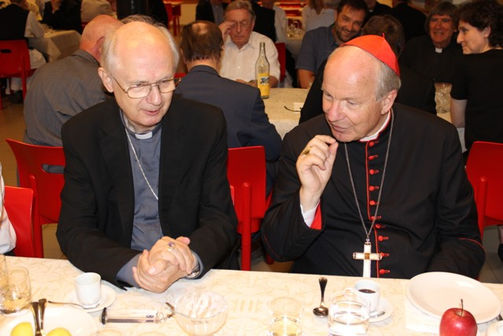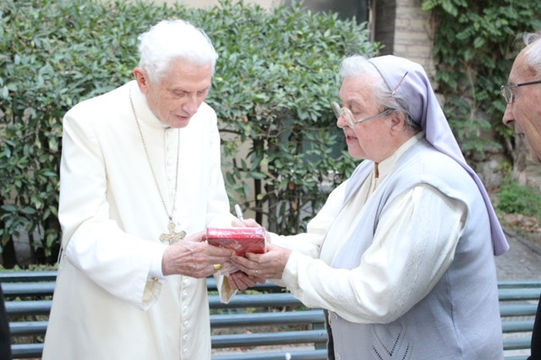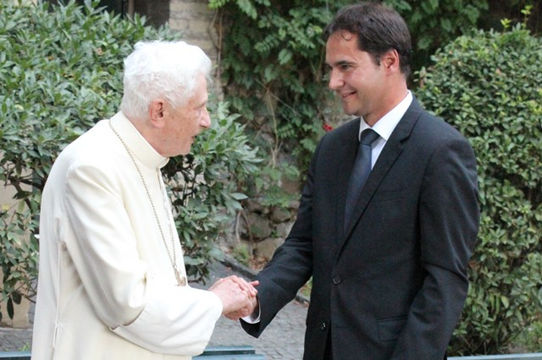EUROPE AND ITS SPIRITUAL CRISIS
Meeting of the student groups in Castelgandolfo 2016
Europe and its spiritual crisis
report
The New Student Group Joseph Ratzinger / Pope Benedict XVI met for the eighth time. together with the group of students of the Pope Emeritus for the central annual meeting in Castel Gandolfo. Radio Vatican and other Catholic media had reported about it promptly. The New Student Circle is grateful that it was able to carry out the full program together with the student group for the first time. Thus, this meeting was clearly marked by an ever-progressing growing together of the two groups of students. Cardinal Schönborn's busy schedule allowed at least a short visit to the student groups. The protector of the new student circle, Cardinal Koch, opened the conference with St. Mass and attended the entire meeting.
Pope Emeritus Benedict had chosen Europe and its spiritual crisis as the subject of the conference – as is well known, a problem that is particularly close to his heart.
With the US lawyer Prof. Joseph HH Weiler (b. 1951), President of the "Istituto Universitario Europeo" in Florence, and the Bishop Emeritus of Graz-Seckau Dr. Egon Kapellari (born in 1936) again gave top-class speakers. Recognizable on the basis of decades of reflection and experience at various levels, they reported competently and aptly on the situation in Europe and the EU.
Prof. Dr. Weiler left his prepared speech manuscript aside and was able to inspire us with a completely free speech in English. In his analysis of the state of Europe, he hardly referred to the political authority EU, but devoted himself to what was peculiar to the continent as such. Weiler began with the "demographic suicide" of Europe, which was an expression of a spiritual crisis of meaning. There is no longer any trust in the future, and more and more selfish thinking is taking center stage. The philosopher sees this as a direct consequence of the situation after World War II. Since then, terms such as patriotism have had negative connotations and mercantilist thinking is increasingly coming to the fore, in which the citizens see themselves as “customers of a cooperation” and the elections as a kind of owners’ meeting. Rights are demanded and politically traded, there is no longer any talk of obligations. Rights are an end in themselves and are internally emptied. The concept of "identity" was important to Prof. Weiler, which is now in crisis. As a mistake, he criticized the widespread idea that any difference would be seen as discrimination. He urgently emphasized Europe's "soul", its permanent and absolutely necessary identity: It consists not only in the philosophy and anthropology of Hellas and in the legal ideas of ancient Rome, but also in the outstanding role of the Judeo-Christian tradition based on these._cc781905- 5cde-3194-bb3b-136bad5cf58d_ These roots have produced Europe in its peculiar form. Weiler emphasized Europe as a "community of destiny" that needs to be rediscovered.
Astonishing and fascinating were Weiler's statements about the fundamental importance of Christianity, not least because of the fact that Weiler is a committed and practicing Jew, as Pope Benedict rightly emphasized at a meeting with 16 selected members of the two student groups in the Vatican Gardens. The Catholic em. Pope and the Jewish professor expressly and noticeably share the highest mutual esteem.
Bishop Kapellari presented a "general, epochal and church-diagnostic" overall view of the situation in Europe. With Blaise Pascal and Benedict XVI. he demanded for Europe and others a life and thinking according to the assumption that God exists. A Europe based solely on legal and market-economy principles cannot survive. The image of "salt in the soup" impressively illustrated how strong an impact minorities like Christianity can have. With Markus Danner he appealed: It depends on you! With a view to the practical question of the immigration movement, Bishop Kapellari pleaded for a “realistic idealism” that is not identical with the rules of a well-intentioned “political correctness”. With federal constitutional judge a. D. Udo di Fabio, he emphasized that a state needs control over its borders, the composition of the population and its own state authority. The bishop recalled the Christian background of the EU and called on the bishops to show critical solidarity. He dealt separately with the questions of life protection. It's about giving Europe a soul.
Saturday was dedicated to the discussion: At the request of the Pope Emeritus, the new student group will give itself the external structure of an association. Due to its different history, no such structure was needed for the student group. Cardinal Koch has worked out statutes with experts, which the em. expressly approved by the Pope. These statutes were initially separated in both student groups and then discussed together. On the basis of the jointly developed improvements, the wish of the Pope Emeritus is now to be progressively implemented.
The reports and debates on various Ratzinger conferences worldwide brought further insights, for example the undiminished growing interest of Methodist and Orthodox Christians and theologians in the thinking of Joseph Ratzinger.
The location of the popes' summer residence, with its somewhat cooler climate compared to the Eternal City, corresponded to the harmonious climate of the meeting and favored it. Theological discussions often ended in the evening with an ice cream on the piazza in front of the Summer residence of the popes.
Fr Dr Daniel Eichhorn FSSP / P.Lic. Sven Leo Conrad FSSP
Summary of the presentations of the meeting of the student groups of Pope Emeritus Benedict in Castelgandolfo 2016
For the meeting of the student group and the new student group Joseph Ratzinger/Pope Benedict in 2016, the Bishop Emeritus of Graz-Seckau, Dr. legal Egon Kapellari, and Joseph H. H Weiler, Professor of International and European Law at the New York University School of Law and President of the European University Institute in Florence. Both personalities have made prominent statements in the past and present on questions of identity and the future of Europe. Joseph HH Weiler sees the main problem of contemporary Europe above all in the conscious exclusion of the Judeo-Christian roots in Europe's self-definition in favor of a one-sided emphasis on the secular heritage, which equates public space almost exclusively with the state.
In his speech, Bishop Egon Kapellari focuses on the attitude of a realistic idealism shaped by Christian hope with a view to the future of Europe: Europe has a future that is worth fighting for, but this attitude and the resulting policy must change always based on the real circumstances and possibilities.
The following texts provide the summary of the two speakers at the end of their presentations.
Excerpt from the presentation by Bishop Egon Kapellari:
Old and new challenges for Christians on the building site of Europe
The growth of unity in global dimensions and above all in Europe was and is a special concern of the popes not only since, but especially since the Second Vatican Council. The occasionally expressed wish that there should be a political world authority that could act in a binding manner was always relativized by the fear of such a model, which could also be or become extremely totalitarian. In contrast, the UN as the current world authority has its well-known limitations and weaknesses. But it could and should become much stronger within its limits. The European Union, on the other hand, is a much stronger plan for more togetherness in Europe and, as is well known, it was conceived and set in motion by Catholic politicians in particular. At the time, it was a realistic project that initially wanted to connect often hostile fatherlands with one another through an economic union in such a way that a war between them would no longer be possible. Since then, this union has been on its way into the future in a great search process between "trial and error" at a pace that is a bit like the much-mentioned Echternach jumping procession, which today, however, never goes backwards in its rhythmic back and forth. I was once as Bishop is officially involved and therefore knows this from his own experience.
The bishops of the EU countries have accompanied the development of this project with critical solidarity in a constant attempt to keep solidarity and criticism in balance or to bring them back into balance. The majority of the episcopates of Europe, together with the Holy See, are certainly in favor of the project of more common Europe through the European Union having a future, although quite a few skeptics doubt this and sometimes do not even fear it. Pope Francis has raised the issue of Europe several times in a way that has made people sit up and take notice, challenging and even overcoming some fatigue and inertia. Most recently, this happened in the Sala Regia of the Vatican at the reception of the International Aachen Charlemagne Prize. The Pope's speech was a great prophetic impulse for inclusion and building bridges against ditches, walls and fences. It was also balm for the wounds of those who were primarily responsible for the European Parliament, the European Commission and the European Council. The ideal horizon of this great speech by the Pope must not be forgotten if the spirit and dynamism are not to drastically diminish in a Europe that has become tired in many ways, including its Christian heritage. However, these ideals must always be grounded anew through realistic idealism.
This idealism is nourished particularly by Christian hope that transcends all difficulties and disappointments. In the face of such disappointments, this hope, which is rooted in the Christian faith, again and again expresses a defiance. She says to God in the words of a psalm that Martin Buber particularly loved and chose as a saying for his tomb in Jerusalem: "And yet I will always remain with you; you have laid your right hand on me" (Ps 73). The philosopher Josef Pieper - as George Weigel tells us, he was particularly connected to Cardinal Joseph Ratzinger but also to Cardinal Karol Wojtyla - in one of his writings Josef Pieper referred to a still almost unknown poem by Konrad Weiß, who wrote in Munich in 1940 Entitled "The Flight into Egypt", this poem is about the childhood of Jesus and is interspersed with two lines of verse that keep recurring. Pieper calls it a picture of immaculate beauty and radiant validity and describes the poem as one of the most perfect German poems. The lines of the verse read: "The rose in hope stands open without fear". In the midst of today's human world and in the heart of Europe, we are also expected to have fearless hope, despite and because of all the difficult things we experience trust courage.
Excerpt from the presentation by President Prof. Joseph HH Weiler: About the spiritual crisis in Europe
Christian messianism and Jewish nomism (law-abiding) were […] the spiritual underpinnings of the European edifice. From this perspective, however, the company was doomed because its "engine", its driving force, was materialistic to the core. The heart of the building was - and still is to this day - the marketplace, the competition and the idea of personal growth that would indirectly increase the wealth of all. The Judeo-Christian tradition may have been the inspiration, but the execution has taken over the market materialism that became the very creed of the European edifice, burying everything else.
The most significant moment came during the drafting of the future constitution for Europe. It is well known [...] that the authors of the planned European Constitution refused to make explicit reference to the Christian roots of European identity in the preamble to this document. I have already discussed in my research essay A Christian Europe that this decision was a betrayal of the solemn commitment to pluralism expressed in that document and unjustified from a constitutional perspective given that around half of Europe's population comes from Member States which have an explicit Invocatio Dei and/or a reference to Christianity in their constitutions. This is a major constitutional asset of the European tradition, proving that religion and democracy, religion and freedom, religion and tolerance can coexist. It is unfortunate that the authors of the European Constitution eliminated this important lesson from what should be its founding document. [...]
In its second paragraph, the preamble proposed by the Assembly distinguishes between the cultural, religious and humanistic heritage of Europe: “Drawing from the cultural, religious and humanistic heritage of Europe…” Interestingly, in the first paragraph, the proposed preamble arranges the values, in particular the primacy of Reason, as the basis of humanism: "Aware that the continent of Europe is a bearer of civilization and that its inhabitants, who have populated it in successive waves since the dawn of mankind, have over the centuries developed the values that found humanism: equality of men, freedom, primacy of reason".
Reading the two paragraphs together leads, I think, to an inevitable conclusion: in the eyes of their authors, the "supremacy of reason" is part of the "humanistic heritage" but is not something one would associate with religion - and of course Religion in Europe means mainly Christianity or at most the Judeo-Christian tradition. The European secular action does not simply mean relegating religion to the private sphere where it will of course be protected as part of our noble and indispensable commitment to freedom of conscience. It is a banishment from the public space of something that shouldn't be there - from a public space committed to the primacy of reason. This constitutional decision excellently and honestly reflects the secular attitude of European political organization. One establishes a priori that religion operates outside the circle of the primacy of reason, then banishes it from one's public sphere and then consigns it to one's private sphere - after all, individuals believe all sorts of unreasonable and irrational nonsense. Benedict XVI I don't want any of that, as I understand him. He reminds us that there are vast questions and problems concerning the human condition (the human condition), such as its origin and its end, that scientific rationalism simply does not address, but does not end should be taken out of the discipline of reasoned discourse. Even more subtly, he seems to be implying that the mere use of the word "religion" should not confer on any belief system the imprimatur of legitimacy from that point of view; he makes the pointed statement that the Catholic tradition in Christianity is particularly committed to the discipline of reason, but that this of course also means in the same breath that it is limited by it.
[…] Whoever takes up the sword – risks dying by the sword. And those who live under a materialistic premise risk perishing under the same premise.
One should not [...] end with a message of despair. Because the current situation also contains the seed for regeneration. Europe is, whether you like it or not, a community of destiny. What any of its member states does has a significant impact on the others, as the sad story of Brexit has shown. The only question, however, is how we will deal with this fate. No state can do it alone. Herein lies the hope.
dr Josef Zoehrer
Meeting with Pope em. Benedict XVI
Photos: Michael Hofmann




